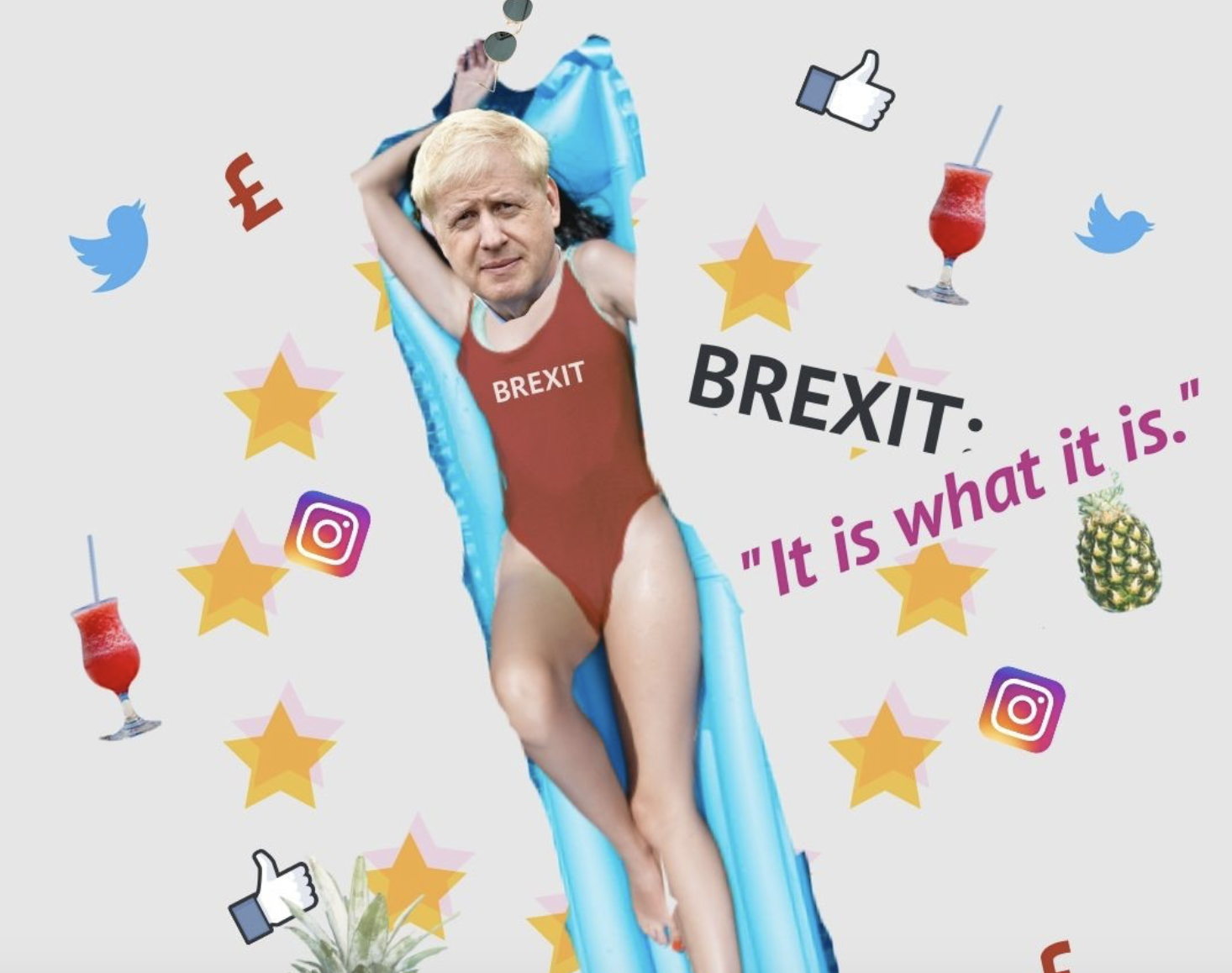All I want is EU: Viewing Brexit through the Love Island lens.
BREXIT:"It is what it is."
All winter, Brexit cast its dark shadow over Britain. It was one tiny word that seemed impossible to ignore, an oppressive, mysterious force no one quite understood. When the sun managed to force its way through this dark cloud, the nation took a collective sigh of relief. It was finally time for the brilliantly mind-numbing Love Island, a PG version of the Hunger Games where hot singletons fight for love. For one hour every evening throughout its eight week run, households throughout the nation, for one hour, dispelled any thought of Brexit. This Single market is, however, sinister in a different way. If you can’t find a love interest, you’re axed. As the Islanders repeatedly remind us, this is Love Island, not Friend Island.
Collage by TK Pluto
The depressing state of British politics seemed, for a moment, to vanish in a haze of fake tan and dry shampoo. The only time that Brexit ever seemed to intrude into this microcosm of paradise was when Hayley Hughes, a Love Island contestant from 2018, assumed Brexit was about cutting down trees. The thought soon disappeared and the girls moved onto the more pressing matter of who they were going to choose in the looming re-coupling.
Yet are Brexit and Love Island really as incompatible as all that? A show that deals with back-stabbing, deadlines and deals might on second glance bear striking similarities to the greatest political crisis of our time.
Let’s first look at the personalities of the show. The most heartbreaking bust-up last season was the fallout between former sweethearts Amber and Michael. When new girl Joanna entered the villa in week 4, Michael’s head was turned and his former allegiance to Amber swiftly dismantled. The heartbroken Amber declared that she had been stabbed in the back by someone she thought would remain loyal. Michael, formerly infatuated, gave her the cold shoulder, thinking like Gove about Boris in 2016 that while he had originally thought Amber was the best person to be his girlfriend, he didn’t think she was the best person at that point. Gove’s thought-process in 2016 was reasonably similar. “It’s not treachery. I explained my reasons at the time. The water is under the bridge.” Michael effectively uses Gove’s words to defend himself against back-stabbing claims. Yikes. Looking at contemporary politics, the parallels continue to emerge. Just as Boris ended up on top – not even his greatest supports would have believed he would become PM – Amber in light of Michael’s treachery emerged the Queen of the people’s hearts on Twitter and won the show. Analysts only had to look at Love Island to predict the way the leadership campaign would go.
Political moves are indeed played out all the time on Love Island. One notable example was the decision of Curtis Pritchard to swap his partner of 4 weeks for another girl, Maura. Popularity is everything on Love Island, and it is hardly coincidental that when Curtis found out that he and Amy were not the public’s favourites, he decided to ditch her for a radically different girl. The words failed Curtis to explain to Amy why he had acted like he had just as Boris, on the afternoon he was due to launch his campaign to become prime minister, still hadn’t written a speech. “I’ve got nothing.” Indeed, Curtis’ decision to ditch Amy, seen by many viewers as a power play, faced the same accusations as Boris’ radical announcement in 2016 that he was a Brexiteer. The jolly feel around both Johnson and Pritchard has enabled them to dodge the consequences of their many slip ups in the race to power. Perhaps Love Island witnessed a politician in the making this year...
It is unsurprising that in a show about deal-making, we see similar patterns of human behaviour on the Island as in the House of Commons. Joanna’s attempt to make Michael support her withdrawal deal when she was dumped from the island earlier this week bore many resemblances to Theresa May’s continued efforts to pass her deal. The reaction was the same. Joanna left bitterly disappointed at Michael’s disloyalty, Theresa at not being able to deliver Brexit for the country she loves. Indeed, the Islander’s constant preoccupation with securing a partner for themselves, one that will help them with the 50K cash prize, can be seen as a parallel to the many negotiations that have nearly come together and then fallen apart at the last minute. The 29th March was a test for the politicians to see if they could stay loyal to the deadline that had been set. Like many of the couples on Love Island who broke up after being separated for a few days in another house, Casa Amor, the deals that had been promised broke down. At the end of Love Island every year, the Public’s favourite couple can win 50K only if they split it together. If one person chooses to take it for himself and the other doesn’t, he will get all the money.
Love Island is to the bitter end, like Brexit, a show about deals. Whether we'll win the EU’s heart and go out with a deal, or whether we will be left hung out to dry, only time will tell.

